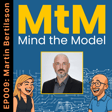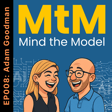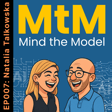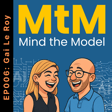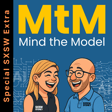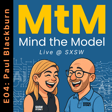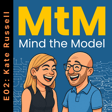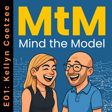Become a Creator today!Start creating today - Share your story with the world!
Start for free
00:00:00
00:00:01

Mind the Model: Episode 003: Louise Cummins
Louise Cummins is an award-winning marketing and digital transformation leader. She ranked in Australia’s Top 50 CMOs. She’s the founder of the Australian Centre for AI in Marketing as well as the founder of AI-Ready Consulting, helping organisations adopt AI with intelligence, ethics, and humanity.
She’s held senior leadership roles at World Vision, H&R Block, and Align Technology. She’s also a published author, keynote speaker, and a passionate advocate for resilience and reinvention.
Australian Centre for AI in Marketing: https://www.acam.ai/
Transcript
Em's AI-powered job search
00:00:07
Speaker
Em, how's it going? how Congrats on the new job. um Thank you, thank you. Yeah, very exciting for you. um Settling in? I am, yes. ah Yeah, it's it's been an adjustment, but I really, really enjoy the new gig.
00:00:24
Speaker
And yeah, getting back into the thick of the BAU of corporate life, I suppose. Sure. So I'm really curious to know how much you used AI to help you get a job.
00:00:35
Speaker
ah incredibly so so for context to our listeners i went through redundancy in january of this year and for the past six months i had been looking for work and i really really heavily leaned on ai as a bit of a co-pilot um uh right hand man or lady and and it it yes it's so we anthropomorph anthropomorphize AI so much. Anyways, and I created some custom TPTs.
00:01:06
Speaker
So that is a tip I can share with the listeners. So what I did is I uploaded a knowledge base of all of my CVs and cover letters, and I named it My Professional Voice.
00:01:19
Speaker
And this GPT was quite helpful in, you know, shaping new cover letters and CVs in that same writing style that I had trained it to. And then also it was really good as a writing assistant helping me slide into the DMs of our upcoming guest, um as well as my new boss.
00:01:39
Speaker
So I think that it definitely helped. It gave me the new job. Gemini Deep Research was fantastic for researching ah the world of free retail media, which I am ah new ah participant in.
00:01:52
Speaker
ah new expert. A new expert, yes. And that um that that market research overview is really interesting. And so that deep research capabilities from ChatGBT, Perplexity, and Gemini were quite useful.
00:02:03
Speaker
and Did you use it for questions too then? like did Was it just a research tool? It was a lot research tool that I used to really gain a good understanding of both the company the companies that I interviewed at as well as like the specific categories they played in or ah their world, like the subcategory the industry if I know was applying for things that were outside of my normal scope.
AI tools for interview preparation
00:02:26
Speaker
ah But the last one is my favorite tip for you. So this is utilizing Notebook LM. Oh, I love Notebook LM. Yes. The tool from Google, what I did is I, on the way to my second round interview at ah my current job, I listened to this little pump up podcast.
00:02:45
Speaker
So what I did is I uploaded my CV for this role and the job description. And you can generate a podcast podcast. ah within notebook.lm, which is you know a great feature of the tool.
00:02:59
Speaker
And what it did was it spat back at me what like these two AI voices saying, oh, wow, Em really hits the mark on all of these roles outlined in the job description. Look at her CV for the job history. And it was a really good, like inspiring, like, yeah, I'm going to nail it.
00:03:17
Speaker
And so did you prompt it to to like give you the pump up thing or were like, tell me why Emily is perfect or it just did it automatically? It just did it. And like and the two sources, yes it was just the source of my and the job description. And that's what the voices came back with.
00:03:31
Speaker
The AI, it's decided to speak about, you know, the summarizing of both of the sources and that's what notebook.lm is so good for. So those are our tips tips for the job search if it's helpful for anyone because I definitely saw a lot of value.
00:03:45
Speaker
Back when I was searching, i the thing that I found really useful is I took a LinkedIn profile information, ah copied, because of course you can't, LinkedIn have locked down the profiles. The links, yeah, don't always transfer well.
00:03:57
Speaker
Yeah, so i either I printed it to a PDF and then put the PDF into the AI along with my information, um similar to your path, as well as the job description, and then asked it to help me understand the kind of questions that I would be asked.
00:04:12
Speaker
And so interestingly, it said, for example, oh, this interviewer is ex-McKinsey and McKinsey liked things in a three-letter acronym, like choice, yeah care, and chaos or whatever it might be. you know So I kind of structured my answers around the way that ah and the advice I got from Gemini. Yeah. Another aspect of the tools that I use is like, you know I've realized going through a lot of different interviews. They're like the star stories or the methodologies of those scenarios. And I find that AI was quite helpful in looking at my you know past performance reviews and kind of distilling those stories because that's often quite, ah it's hard to, it is, I find it hard ah to talk about myself in that context.
00:04:59
Speaker
So using g AI as like that writing co-pilot to help. Sure. may craft those stores in those scenarios, which is quite
Creative uses of AI
00:05:06
Speaker
helpful. Well, look, I know we've got to get to our guests. But before I do, I just wanted to to show you something that I've been playing with. Yes, please. um you know this is a surprise to you. But hopefully, ah you'll you'll recognize. Hold on. I'm not sure if you can see very well. You'll recognize that photo.
00:05:21
Speaker
that's you. yeah That's me. Yes. Oh, gosh. That's definitely you. So I um have been playing with ah the new and ah Banana Nano from Google. That is you as a steampunk astronaut.
00:05:34
Speaker
and But I thought like that was just a little bit too easy because it looked like it just ah clipped your face there off. So what I did is I asked it to make you um like a fierce one with lasers, which I don't think it got the brief particularly well.
00:05:49
Speaker
um So I tried a couple other ideas. I said, like this is you in a a monarch butterfly dress.
00:05:58
Speaker
My favorite one is this one here. This is a ah sad superhero. Oh, I look fierce, but sad. Yeah. and This one is the by far the best, I think. It really does look like you.
00:06:09
Speaker
And then I found another tool that somebody made with the API, which shows you throughout time. So if you need inspiration for any upcoming costume parties, let me know. found that one the bottom left of the screen, like the almost.
00:06:23
Speaker
Oh yeah. I thought that was really good. The fifties one, like I thought the behind it is, uh, is pretty yeah pretty special too. So there you go. That was, um, that is hilarious. Thank you so much. That made my day, Nate.
00:06:33
Speaker
That was the new banana nano. Very clever, very good image editing. And the cool thing is, is you can just tell it like, yes, I like that aspect, but we want to change something else and do something. So anyway, um, have a, have a play with banana nano, uh, in Gemini now.
00:06:48
Speaker
We've discussed this before at length about how image editing is such a punish. So, Banana Nano, i will I will definitely check that out. But listen, we can chew the fat all day.
Guest Introduction: Louise Cummins
00:06:57
Speaker
That's not why we're here. We're here to chat to the wonderful Louise Cummins.
00:07:02
Speaker
So our guest today, Lou, she is an award-winning marketing and digital transformation leader. She ranked in Australia's top 50 CMOs. She's the founder of ACAM, the Australian Center for AI and Marketing, as well as the founder of ai Ready Consulting, helping organizations adapt with intelligence, ethics, and humanity.
00:07:21
Speaker
She's held senior leadership roles at World Vision, H&R Block, and Align Technology. She's also a published author, a keynote speaker, and a passionate advocate for resilience and reinvention.
00:07:33
Speaker
Wow, what a bio, what a woman. Louise Cummins, welcome to Mind the Model. Wonderful. Thank you so much for having me. i love your format of the show. It's fantastic. We're so glad that you joined us today. And just to crack us ah into a bit of an icebreaker, what is your preferred gen AI model right now and why? You know, looking at ChatGBT, Gemini, Claude Grock.
00:07:53
Speaker
ChatGBT, OpenAI all the way at the moment. And it's really interesting. I think you've become quite... it addicted to your particular LLM because you've actually trained it. So, yes, i've obviously i do like Gemini and I do play with it, but ChatGBT is my favourite. And it's really become ah you real, it's moved from being an assistant to a trusted strategic partner because I've spent time making, you know, so but really training it on everything
00:08:25
Speaker
everything that
AI in daily life and marketing revolution
00:08:26
Speaker
I'm doing. So it's been, yes, yes, that's my preferred. I'm not as bad as I saw somebody the other day who has, um because they talk to it. I don't know if you guys talk to. i was just talking to mine earlier today for the first time. Yes. And responding. So they've named it. They are the way home. They talk to it and talk about their day. And it's quite fascinating. Sort of thing or for for like advice advice.
00:08:53
Speaker
No, no, no. So you kind of downloading, this is what happened during the day. These are the things I need to happen at night, but also just starting to have that two-way conversation. So it's not written, and it's actually verbal.
00:09:06
Speaker
and Okay. Yeah, I think that's for AGI, that's what I think is the path for being able to speak and interact with a LL model and have that.
00:09:17
Speaker
Like, I mean, if I was driving home from work and I started talking to my Gen AI, and it could start to plan out my day for tomorrow. Listen, I can see everybody having their own companions and my companion will speak to your companion about, you know, when we're next available for coffee. What would you call it to your AI?
00:09:37
Speaker
What's yours? I don't know. Is it weird that the first thing that comes to mind is like Sparky? Sparky. Almost like a pet, like a robo pet. Okay. I'm not judging.
00:09:49
Speaker
like something where there's AI in it, like Daisy or something like or something. So that that's clever. You're never really crossing the line that it's not AI.
00:10:00
Speaker
I think I'm ah like an Iron Man Jarvis kind of guy. Like, you know, it's got that old English butler plus a bit of Iron Man in there. Anyway, um Lou, you've seen the huge shifts in marketing before. Why do you think AI is is it the most disruptive one yet?
00:10:15
Speaker
I was one of the first product managers for Fujifilm digital cameras. So that was also, you know, interesting big seismic shifts. um And even with MGM Studios with the DVDs coming in, to so big sort of changes.
00:10:34
Speaker
And I've been around for the beginning of the internet lately beginning of social media, but this is this dwarfs everything and in comparison. For me, I feel like this is on par with the industrial revolution.
00:10:51
Speaker
Pippening slightly, Lou, I know ah you're super passionate about AI and marketing, and I from have been a fan, ah candidly, from afar for
Founding of ACAM and its initiatives
00:11:02
Speaker
quite some time. As I saw you and others have recently founded ACAM, which is the Australian Centre for AI and Marketing.
00:11:09
Speaker
Why did you find found it? Why did you and the other members, you know, put your own money behind it? So the Australian Centre for AI and Marketing does both paid and free education and thought leadership in this space.
00:11:25
Speaker
um In addition, we do advocacy. So I've just released a white paper around youth and the implications of ai in youth and that's going to be the subject for my South by Southwest panel coming up, giving a bit of a plug there.
00:11:42
Speaker
So we've also really leant into gender and gender bias in AI. So there's not enough women learning AI, there's not enough women. There's a bias obviously in AI. So we're sort of, we're leaning into an advocacy space as well.
00:11:59
Speaker
And then the other section of it is obviously helping out corporates in their journey to embrace AI. One of the aspects of ACAM that I'm aware of is the AI pioneer circle.
00:12:13
Speaker
And is that about setting a roadmap for them? Or what role does that circle play for ACAM? And and what have ah what kind of insights have come out of it? So we have current representation from ANZ, Woolworths, IKEA, AGL, Blue Scope, the iconic. Really, we wanted to get a real broad range of different organisations.
00:12:39
Speaker
And part of what we're doing is we provide education, training, but also they have peer group of where they are learning They're sharing insights in terms of, you know, nothing confidential, but their insights around um where they're at and thinking.
00:13:03
Speaker
And they're also helping us with white papers. So we're going to be announcing next week around Marketing Team of the Future white paper that we've co-authored with um the pioneers and we've also done that with our new partner Adobe.
00:13:22
Speaker
Can you give us some of those insights that have come out of that? No, we've gone through different archetypes of what is going to be required in this next era and the key traits, but also a number of different um roles that we believe will exist in that new era. In front of those similar conversations, there particular worries I think it's about time. And the reason I say that is there's a whole heap of stuff around governance.
00:13:50
Speaker
How do you take your teams out, you know, in the right way? What does it look like from your MarTech stack? You know, I can list the different areas.
00:14:02
Speaker
But marketing across the board, from my experience, there's not many marketers that go, gosh I don't know what I'm going to do with myself today.
AI's role in enhancing marketing creativity
00:14:12
Speaker
You know, they're all exhausted and they're all sort of working so hard. So we're actually saying to all these teams, hey, now completely rethink about the way you're doing things. How do you find that time in an already very congested role.
00:14:33
Speaker
And I think that's that's part of the problem is that, you know, i one of the reasons i love what we're doing is I can see a way that we can use AI to people to get back the soul of good marketing and actually why we joined this in the first place. One of my clients is Bree who heads up marketing for Procore, which is a construction software company. And we were working with her on the next sprint and she went,
00:15:02
Speaker
wait a second, we need to rethink this. And what she said, I thought next was actually brilliant. She said, rather than us going into this next sprint and just thinking about new things, we're going to be thinking about what we take away.
00:15:18
Speaker
So in the next quarter, every single person, we've ah they've already got a lot of tools, and a lot of AI capabilities, And that she said every single person in their role has to think about how they're going to optimize their week to find three hours back every week.
00:15:37
Speaker
Yeah, just I think back to the fact that I've had time out of the professional workforce for six months this year. I was able to go down a lot of AI rabbit holes, do a lot of coursework, self-teach, you know, the different chat GPT, you know, custom GPTs and all the like.
00:15:56
Speaker
And if I didn't have that time out of my day to day, i don't think I would be at this space that I'm at now. And so I think, Lou, what you're talking about is being on like really strong leaders should be thinking about how to give time back to their team because that time is where the good ideas bubble up and the strategy starts to form.
00:16:13
Speaker
I heard from the CEO of UNICEF the other day. I thought it was fantastic. He said, I want to use ai to stretch my team, not to shrink them.
00:16:25
Speaker
But Emma, I think you're a really good example because we connected while you were having that break. A really good example of somebody that leaned into that education in a really meaningful way.
00:16:37
Speaker
i loved, I was listening to you talking about Notebook LM and your custom GBTs. That's the sort of stuff that I think is fantastic. So i just wanted to applaud you for actually taking that approach.
00:16:51
Speaker
I've loved the work that, you know, ACAM has done. And um I was so lucky. Thank you to ah for you to invite me to the release of your benchmark report. because that was just so fundamental. You have to kind of and you know understand what the industry is saying and their thoughts and feelings about it.
00:17:08
Speaker
And we noticed, because Nate and I spoke before
Challenges in AI integration and implementation
00:17:13
Speaker
this podcast about you know the different metrics that were measured, and one thing that we were quite curious about and we wanted to hear from you, what percentage of CMOs are actively using ai And I want to phrase it in a way of actively using it besides just a co-pilot to help write emails, like utilizing it for innovative strategies and how to think differently.
00:17:39
Speaker
So when you say use it, yeah like there's very few CMOs that would know how to go into Salesforce and and actually proactively use it or Marketo HubSpot, whichever you know solution that they you you know do Do you understand what i'm saying? so Totally. i know this lawyer That's not what the job is. Yeah. Are they on the tools?
00:18:03
Speaker
Are their teams using it? And then what how people are using AI is so different. So there's very few teams that I go, okay,
00:18:14
Speaker
They've got a really clear roadmap where it's going to actually support with strategy in terms of how is it going to reinvent the way that they use research and synthetic data and how are they actually using it for better data science models? How are they using it for better journey mapping? There's not one organisation that I've gone in and gone, wow, across all the pinwheel of marketing.
00:18:43
Speaker
They've been very active in all of that space. You know, it's interesting from my perspective of being new in a role in a new company, that's a large organization from the outside.
00:18:54
Speaker
I was like, wow, AI is moving at such a fast pace. And now inside the company, I'm like, oh, wow. the The time it takes to embed generative AI at all different levels, it is a continuing conversation. And there has to be data engineering resource allocated to you know prompt engineering. Is that problem a Gen AI problem or is it an ML problem, a machine learning problem?
00:19:21
Speaker
So I just find it so interesting. And I was having the cheap and the chat to Nate earlier this week about how from the outsider of the industry, we think like, wow, it's going to disrupt and be so fast. But really, it's we are actually moving quite slow.
00:19:36
Speaker
Because it's complicated, right? It's complicated. And we want to be very cognizant of how we're doing it because as we have all seen in the news recently with CBA announcing the backflip on and you know the redundancies for those the call the health support staff, like businesses are going to get it wrong. It's going to be quite public and embarrassing.
00:19:58
Speaker
think you're 100% right, Aime. It's fascinating how... People think that it's all going to happen really fast and I think there will be elements of that will come fast, like I was saying, at the bumpiness of it because, to your point, there's really complex Martech stacks, you know, there's Yes, you can add different layers, but most people's MarTech stacks are pretty chaotic anyway.
00:20:26
Speaker
And then you don't want to keep starting onboarding a whole heap agents on top of that. Like, interestingly enough, Microsoft has onboarding for their, I was told this the other day, where they actually onboard agents like they do employees.
00:20:41
Speaker
so that they've got a track of where they are and things. Because can you imagine you'll have employees deploying agents and then leaving and there'll be these agents, you know, different places.
00:20:53
Speaker
Headless robots. through ah Exactly. But I do think that the the timing is really interesting. So it's not, some things will take, be quite quick, but then if you don't have the right MarTech stack or the right sort of, even the data taxonomy, like that, that's really basic, right? But a lot of people don't have a shared drive that's up to date with good content. A lot of it's just sort of a catch all of, you know, often not very great stuff.
00:21:23
Speaker
It's such a great point, Lou, though, that like, but The data taxonomy, because that came up in a conversation just the other week of um if we are going to look at Gen AI, which is based on the natural language, okay, well, it in our corporate business speak, we need to write out what that acronym means in plain terms so that if we do deploy ah Gen AI model on top of it and underpin it with some ah with a large language model, then it will call back to that exact definition.
00:21:53
Speaker
But the the steps and the intricacies of actually fully enabling ah generative AI methodology in businesses is much more complex complex than I previously thought.
00:22:04
Speaker
Are you kind of privy to any conversations among CMOs or clients and how they're thinking about AI and creativity and um any boundaries that they're placing on it at this point?
00:22:14
Speaker
I feel like there's there's very much a boundary setting amongst the marketing community at the moment of we will provide the ideas behind it, and then we'll use AI to support with the production.
00:22:31
Speaker
i think there's an interesting tension point now that all the agencies are sort of playing with of how much will be human versus AI, and that's going to be a really interesting tension point of how that goes.
00:22:47
Speaker
So it's kind of, I guess, just really ah an evolution of efficiency at this point. I would say that that's the key thing, but ah you're starting to see more and more marketers starting to play around with um the production more especially. However, what I have seen, which has been really interesting, was one client in the creative sector and their team was very anti-AI.
00:23:14
Speaker
ai and what was really interesting, we did an exercise and they had a creative idea that then the AI built on, that then the team then had another creative idea that the AI built on. And it was fascinating because it was this escalation of creativity.
00:23:36
Speaker
And I wish I'd recorded it because it was fascinating to see how, and they recognised that they wouldn't have the landed, these are very creative people, they wouldn't have landed at the same spot without AI. So it was a true example of The
AI's impact on job roles and future workforce
00:23:53
Speaker
humans being in the driver's seat, but actually AI being the support to actually build on the creativity. And I thought that was a really interesting example.
00:24:02
Speaker
Do you see that there are certain roles that are more or tasks maybe even that are more at risk within the creative industry? Production definitely is going to. And some of the sort of more junior accounts, you know, anything that has to do with reporting timesheets or anything that's very administrative.
00:24:23
Speaker
Lou, to that point, if you could go back to a point of view, if you're wearing a CMO hat, what do you think the marketing team of the future is going to look like? At the moment, we've somehow, over the last 15 years, become very specialised in marketing. So there's a lot of very specialist roles.
00:24:42
Speaker
And I feel what will happen with AI is we'll move back to more of those generalist thinkings because a lot of the specialty will actually be potentially automated or we can actually leverage your AI for it.
00:24:55
Speaker
So I think the biggest things that I'll be looking for within marketing teams, if I was... People that are curious, creative, critical thinkers, wanting to change evangelists.
00:25:13
Speaker
Mm-hmm. And still with all of that great thinking that around what makes a good market, ah being client centric, all of those key, you know, that's the fundamentals.
00:25:28
Speaker
But then there's all these character traits around it that I think will actually create the right archetype for the future. And you want those people on your team.
00:25:40
Speaker
I think you bring up a really good point, though, because it's, I think personally, it's too early to say, this is what the roles will look like for the new marketing team of the future with AI.
00:25:50
Speaker
My background is in data strategy. So analyzing data and shaping insights.
00:25:56
Speaker
And I want to say that Gen AI does it better than me now, which is terrifying because I was like, oh, there goes my job. But what I've realized is I use that and I leverage it for my benefit to then shape, okay, great. How can I then look at this through the viewpoint of, of a commercial lens and what are different aspects of the business that we can commercialize based off of those insights.
00:26:16
Speaker
Whereas previously I wouldn't pre AI, gen AI days, I wouldn't have had that time or that space to really think about, and leveraging those insights in more of a commercial fashion.
00:26:28
Speaker
and And the basics, the soul of good marketing, what makes a good marketer, and rather than having ah SEO experts, you know, like ah SEO experts didn't start marketing their degree wanting to be ah SEO experts. We've just somehow sort of funneled people into these very specialised areas.
00:26:50
Speaker
And I think we'll go back to how it was when I started, which was more generalist and which creates a better pipeline for leadership anyway.
00:27:01
Speaker
Well, speaking of that, I am very interested in like the long-term impact and the future hiring of junior staff and what that means.
00:27:13
Speaker
Are you seeing – have you done any benchmarking around the number of junior hires being made across the industry and whether that's changed over time? We haven't done that benchmarking, but we are hearing internationally that you know that's being affected.
00:27:29
Speaker
I am terrified of it, yeah mostly because we're not going to get the pipeline of future leaders for tomorrow. So because let's face it, if you take positions away, you're going to be left with insecure overachievers and And they're not really poster children for mental health, right, good mental health. So you're going to end up with a whole tsunami of people being really stressed out and that that really concerns me. So we're not going to have the right pipeline but we're also going to have
00:28:03
Speaker
let go of talent and the people that are talented that will still be there will be, I think, potentially burnt out. So I really advocate on how do we actually use this for good rather than actually going, okay, we're just going to use it to find team efficiencies.
00:28:25
Speaker
Yeah. Do you feel like we're heading to everybody having a three-day work week?
Ethical AI use and regulation
00:28:30
Speaker
Or a world where we're just expected to do more and more and more because AI can empower us to do more and more and more.
00:28:39
Speaker
I think we have to be really intentional. And at the moment, I don't feel like people are being intentional because it's so new and they're running. And you know how I said, like, how do you take a breath?
00:28:50
Speaker
I feel like you have to go as an organisation, where is my true north and what do we want to stand for? And then actually go, okay, and B, I think we're going to see a rise of transparency for consumers like we did with the environment.
00:29:05
Speaker
of, okay you know, is there an AI trust, Mark? Are they using AI um to be energy efficient and supporting the community? And I think that will come. At the moment, we're not there, but, um ah yes, the answer is...
00:29:24
Speaker
and Unless we're intentional. and it's ah It's like recycling. You have to be intentional. You have to do it. You know what mean? Yeah, yeah, no, totally. Otherwise, just going to all be a free-for-all and do it what's right for us.
00:29:35
Speaker
And do you think that intentionality happens at a business by business, or is it a government thing, or where where does it sit? We had a new think tank recently and it was a really interesting conversation.
00:29:46
Speaker
Where we landed is, well, what is everybody's individual role in this? So rather than abdicating to say, I think that the government should be part of it is, and I say this to the people where training and marketers is,
00:30:00
Speaker
you need to be your own ethicist too. You know, you need to be, if things aren't right, you need to speak up. So I would say it first of all needs to come from the individual.
00:30:10
Speaker
And then I think we're going to see businesses being more intentional and then the government will catch up because of the pace of change. But if we try and do it the reverse and wait for the government, it's it's it's too big a juggernaut to actually catch up at this point. See, I want to challenge you on that, Lou, because i agree. I think we each should have an individual role in really advocating for, like, responsible use and whatnot that
00:30:43
Speaker
I think especially in Australia, and I'm coming at this, both Nate and I are originally from the States, but in Australia, there's such a ah rich history of regulation, for better for worse. And that's just what the country, I think, is really known for at this point.
00:31:00
Speaker
The country of Amongst other things. Yes, it is up to us as individuals to really stand up for regulation. what we believe in, but the collective group that would speak the loudest would actually come back to, you know, the industry bodies or the government.
00:31:17
Speaker
Yeah. I think we shouldn't necessarily give them too much of an excuse to not do their job. Well, that is such a wise, a wise provocation. And because I think it was more to, in my mind, the phasing of it, but yes, we've got guidelines around,
00:31:37
Speaker
social media so there's this whole tension point of how do we actually get australia to move faster whilst putting in the right guardrails across every single sector yeah and yeah it's something really pointy i don't envy it yes i think it's easy to kind of go there responsible i think they are but it's gosh it's a it's a It's a lot to cover.
00:32:00
Speaker
Just wrapping up, we've got a couple of maybe more quick fire kind of final questions just ah to it round things off.
Optimism and future of AI
00:32:07
Speaker
um I'd love to know if you have ah an approach or a methodology that you use ah for prompting.
00:32:13
Speaker
This is embarrassing. Do you want to hear my prompting? sometimes I love it. Because sometimes get a bit um yeah tired. So if I'm tired, actually ask Chachi BT to – get I want to give you the perfect brief for this. Ask me one question at a time to create the perfect prompt for you. Okay.
00:32:37
Speaker
That's my my tips because sometimes although I know how to prompt like a pro and all the rest of it, sometimes when I'm just busy, I'm just like take me through step by step on how to actually make the best prompt for you to actually help me with this.
00:32:50
Speaker
Okay. I think that's an amazing tip. That's genius. Yeah. Because I found from my perspective, it i almost it's harder to start than when you're in the midst of it. So like it can seem quite confronting. Oh, I need to craft the perfect prompt to get the most you know amazing response.
00:33:09
Speaker
And really, you just you have to get started. Sometimes I'll actually say, like if it was a leadership thing, write me a provide me a brief, but actually assume that I'm Barack Obama or something. You know what I mean? I actually do it in a view of how would ah a world leader or right entrepreneur or I don't know, somebody that. So you use that kind of persona thing. One that I have for you, Lou, what is a recent AI fail that comes to mind where, you know, you tried to get something out of Gen AI and it just absolutely did not work for you? What did you learn?
00:33:45
Speaker
You know what, I'm going to tell it. It's so embarrassing. So I went to a Sydney Uni alumni event, okay, and it was really good. And so what I do is I generally put, like, take notes in my notes folder.
00:34:02
Speaker
And if I feel like it's relevant because you know, been told let's post couple of times a week with LinkedIn. So i was like, okay, I'm taking notes. and Now, context, I've been a lot of panels recently.
00:34:16
Speaker
So my chat GBT is used to writing posts about being on a panel. Anyway, I did this post and i did the and I put it in and it all looked really good and put in some photos, tagged the people and all the rest of it.
00:34:34
Speaker
There was one word that when I woke up the next day, i was like, morsified So what I wanted to say was thank you to the panelists. I learned so much.
00:34:48
Speaker
Okay. That's what I wanted to say. What I said by accident was thank you to my fellow panelists. And I was like, No, it looked like I was crazy that I was actually on the panel, but I wasn't.
00:35:03
Speaker
And it was just that one little word. And I was like, wow, it was such a good illustration of how you need to be double-checked. And normally I double-check stuff, but it was a really interesting insight that just one word could be such a fail.
00:35:19
Speaker
M and I on our group chat, and that we were talking about the Deloitte screw-up, where they have just done all this research and charged the government and of Australia $400,000, and half of it seems to be ah made up by ChatGPT or something.
00:35:31
Speaker
And there will be a ah role for junior analysts going forward, and it will be checking all of the output of the ChatGPT. Well, I've also heard Wild Wedge.
00:35:42
Speaker
They put in, I'm not going to actually name the particular solution because I don't, but... They put in an LLM, and this is now I've heard it, in two different organisations, and they had gave it access, full access to all the different systems.
00:35:59
Speaker
Think about different systems. So how much does the CEO make? How much does, and, of course, it came up. So, yeah, so I think there's a there is going to be some fails along the way.
00:36:13
Speaker
Last question, and it kind of comes back to something we were speaking about previously. Do you see yourself as an AI optimist, pessimist, or realist? Wow.
00:36:25
Speaker
I think that I am naturally a very positive, optimistic person, and that's why I've gone into this with the passion to make sure that my negativity fuels the right guardrails that we need to put in to lead us to a point of positive, like continue to be positive about our future.
00:36:52
Speaker
so optimist. Optimist. Excellent. Love that. Love it. With an asterisk. Yeah.
00:37:02
Speaker
I considered optimist. I considered optimist. Excellent. It was fantastic having you on the pod. Thank you so much, Thank Thanks for your time. appreciate your time. Really appreciate it.
00:37:14
Speaker
I thought that was, it was fantastic. Louise is such a wealth of knowledge and I i really appreciated her stance on um making sure that AI could help amplify back to that soul of marketing. That really, really resonated. That was my key takeaway of like, what can we get back to that true, the true North star of what we we aim for in marketing. So. Yeah. And I thought in particular, just, um I really valued the the fact that she's been able to spend so much time recently with CMOs talking about AI.
00:37:42
Speaker
And while there is no like real consensus as to where AI is going yet, having those touch points with those senior leaders who are trying and really engaged, I think, is just such an important thing that all of us to keep in mind. you know We've got to continue to really get involved.
00:38:01
Speaker
For sure. We are all on the journey. As always, remember, please, that the intelligence might be artificial, but all the wins are real. This has been Mind the Model. Thank you very much, and have A beautiful afternoon.
00:38:19
Speaker
This episode was brought to you by Testchimp. Testchimp is a web developer's best friend. Meet the QA co-pilot that knows your code better than you do. Testchimp uses deep runtime context to automate your testing workflows.
00:38:33
Speaker
Generate scenarios, write scripts, and fix bugs all in one place. Stop wasting time and start shipping quality code faster. Bugs suck, but finding bugs doesn't have to with Testchimp.
